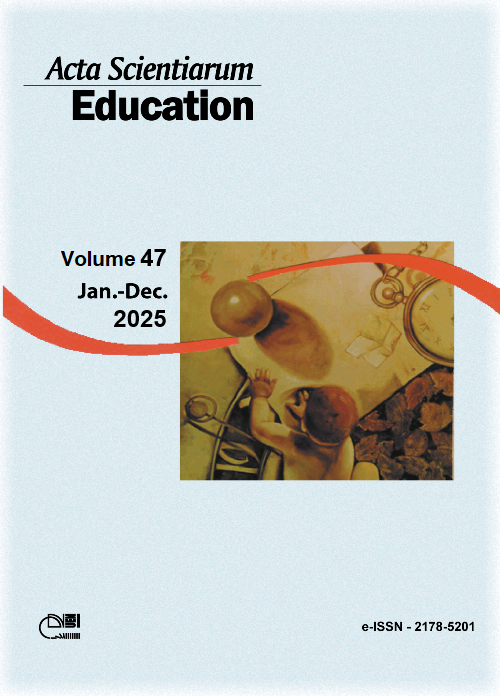Democratização da gestão escolar: desafios, contradições e experiências de formação pedagógica
Resumo
Na perspectiva educacional atual, a gestão democrática cada vez mais ganha espaço pela sua importância na busca de uma realidade em que todos os agentes que compõem a escola participem ativamente da construção da escola que se pretende. Com foco nos desafios e contradições desse sistema, buscamos refletir no âmbito da formação em Pedagogia da Universidade Federal de Sergipe, sobre experiências do Programa Institucional de Bolsas e Iniciação à Docência (PIBID) e Estágio não obrigatório na área de Gestão, ambos realizados em duas escolas estaduais situadas no município de Aracaju, no estado de Sergipe. Para a elucidação da relação entre Gestão Democrática e Formação Pedagógica, discutimos inicialmente os pressupostos da gestão democrática da escola pública e em seguida problematizamos a gestão democrática, a partir das experiências de formação pedagógica, entendidas como espaço de construção de conhecimentos necessários à atuação profissional competente, qualificada e socialmente referendada. A pesquisa buscou analisar elementos dessas narrativas como forma de compreender os entraves que impossibilitam a garantia de uma gestão democrático-participativa. Para que a gestão democrática aconteça, é necessária a disseminação desse modelo de gerir, a fim de que a comunidade escolar entenda sua real importância dentro desse contexto, e assim ocorram a participação efetiva e a colaboração mútua entre seus agentes.
Downloads
Referências
Cury, C. R. J. (2007). A gestão democrática na escola e o direito à educação. Revista Brasileira de Política e Administração da Educação, 23(3), 482-495. https://doi.org/10.21573/vol23n32007.19144
Dourado, L. F. (2007). Políticas e gestão da educação básica no Brasil: limites e perspectivas. Educação e. Sociedade, 28(100), 921-946. https://doi.org/10.1590/S0101-73302007000300014
Gadotti, M. (2000). O projeto político-pedagógico da escola na perspectiva de uma educação para a cidadania. In M. Gadotti. Perspectivas atuais da educação (pp. 35-40). Artes Médicas Sul.
Gadotti, M. (2014). Gestão democrática com participação popular no planejamento e na organização da educação nacional. Conferência Nacional de Educação. https://www.jaciara.mt.gov.br/arquivos/anexos/05062013105125.pdf
Lei nº 9.394, de 20 de dezembro de 1996. (1996, 20 de dezembro). Estabelece as diretrizes e bases da educação nacional. Presidência da República. http://portal.mec.gov.br/seesp/arquivos/pdf/lei9394_ldbn1.pdf
Libâneo, J. C. (2001). Organização e gestão da escola: teoria e prática. Alternativa.
Libâneo, J. C. (2004). A aprendizagem escolar e a formação de professores na perspectiva da psicologia histórico-cultural e da teoria da atividade. Educação em Revista, 24, 113-147. https://doi.org/10.1590/0104-4060.352
Lima, M. H. M. (2014). Estilos de gestão e a influência na administração escolar. Revista Internacional de Investigación en Ciencias Sociales, 10(2), 230-238. https://revistacientifica.uaa.edu.py/index.php/riics/article/view/222
Lück, H. (2009). Dimensões de gestão escolar e suas competências. Positivo.
Monteiro, M. A. A., Monteiro, I. C. C., & Azevedo, T. C. A. M. (2010). Visões de autonomia do professor e sua influência na prática pedagógica. Ensaio Pesquisa em Educação em Ciências, 12(3), 117-130. https://doi.org/10.1590/1983-21172010120309
Negrini, S. M. (2008). Gestão democrática da escola pública: uma relação teórico-prática. Faculdade de Ciências e Letras de Jacarezinho (FAFIJA).
mParo, V. H. (2010). A educação, a política e a administração: reflexões sobre a prática do diretor de escola. Educação e Pesquisa, 36(3), 763-778.
Riscal, J. R., & Luiz, M. C. (2016). Gestão democrática e a análise de avaliações em larga escala: o desempenho de escolas públicas no Brasil (Coleção Especialização). Pixel.
Santos, L. M. B. (2021). A democratização da gestão: um estudo acerca de seus desafios e contradições a partir das vivências de PIBID e Estágio não-obrigatório [Monografia de Conclusão de Curso de Pedagogia, Universidade Federal de Sergipe].
Souza, A. R. (2019). As condições de democratização da gestão da escola pública brasileira. Ensaio: Avaliação e Políticas Públicas e Educacionais, 27(103), 271-290. https://doi.org/10.1590/S0104-40362018002601470
Therrien, J., & Souza, A. T. (2000). A racionalidade prática dos saberes da gestão pedagógica da sala de aula. In V. M. Candau, J. Birman, Â. S. Therrien, J. Therrien, F. D. R. Santos, A. C. Kuenzer, L. D. Valle, M. V. Costa, S. Weber, & M. Reigota (Org.), Cultura, linguagem e subjetividade no ensinar e aprender (pp. 77-96). DP&A.
Veiga, I. P. A. (1998). Projeto político-pedagógico da escola: uma construção coletiva. In I. P. A. Veiga (Org.), Projeto político-pedagógico da escola: uma construção possível (pp. 11-35). Papirus.
This work is licensed under a Creative Commons Attribution 4.0 International License.
DECLARAÇÃO DE ORIGINALIDADE E DIREITOS AUTORAIS
Declaro que o presente artigo é original, não tendo sido submetido à publicação em qualquer outro periódico nacional ou internacional, quer seja em parte ou em sua totalidade.
Os direitos autorais pertencem exclusivamente aos autores. Os direitos de licenciamento utilizados pelo periódico é a licença Creative Commons Attribution 4.0 (CC BY 4.0): são permitidos o compartilhamento (cópia e distribuição do material em qualquer suporte ou formato) e adaptação (remix, transformação e criação de material a partir do conteúdo assim licenciado para quaisquer fins, inclusive comerciais).
Recomenda-se a leitura desse link para maiores informações sobre o tema: fornecimento de créditos e referências de forma correta, entre outros detalhes cruciais para uso adequado do material licenciado.
















































